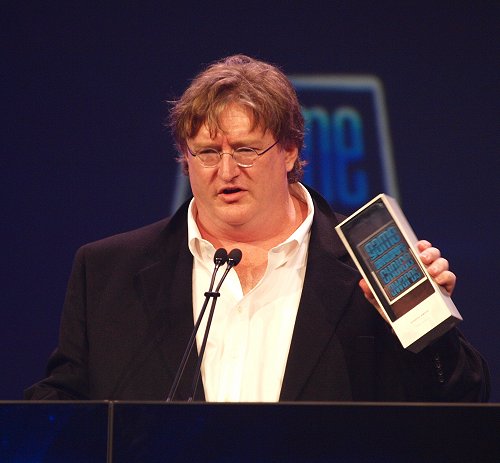09.20.13
Posted in GNU/Linux, Hardware at 8:13 am by Dr. Roy Schestowitz

Source: Official GDC
Summary: The long-ridiculed claims that GNU/Linux has reached its year of desktop prominence are becoming mainstream
Valve is shifting away from Windows and will soon reveal its GNU/Linux appliance [1-10], which will be a gaming machine. Intel, the largest chipmaker, is meanwhile showing increasing levels of support for GNU/Linux leaders [11] (except Canonical’s forks with Ubuntu [12]) in order to sell chips on devices [13-14], desktops/laptops [15], and servers [16]. There is clearly a lot of work going into kernel-level improvements [17-20] and Intel now foresees a future of GNU/Linux as the dominant desktop platform [21-22]. Given that even allies of Microsoft (or former staff-turned-entrepreneur with net worth of $ 1.1 billion) switch to GNU/Linux so enthusiastically, can anyone still say with a straight face that GNU/Linux will never “make it”? █
Related/contextual items from the news:
-
Valve are making another Linux push towards having their full library available on Linux, this time it’s Half-Life: Source & Half-Life Deathmatch: Source.
-
-
Running With Scissors has revealed some but not all of the details of what will come with the Postal 2 (Steam, Desura) DLC!
-
-
Gabe Newell, CEO of Valve declared that proprietary software and closed platforms are gaming’s past, its future is open and on Linux.
-
For those that didn’t yet watch Gabe Newell’s talk about Linux gaming, at the end of the presentation he notes next week will be more information from Valve about their plans to bring Linux into the living room.
-
Valve chief blasts PC market, promises big news is coming next week.
-
Gabe Newell was one of the prominent speakers today during the first day of LinuxCon in New Orleans. Here’s an upload of his presentation where he’s trumpeting the benefits of Linux for servers and gaming. Gabe believes, “Linux is the future of gaming.”
-
Linux is landing on gaming systems and embedded devices, but challenges still remain as leading technology thinkers detail the state of Linux at the LinuxCon conference.
-
The gamers among us waited… very… patiently… for Steam to come to Linux. This week, Valve co-founder Gabe Newell came to LinuxCon to talk about Linux, gaming, and how important open source is to the future of gaming, which given the audience, he described as “sort of like going to Rome and teaching Catholicism to the Pope.” In even better news, he also strongly hinted at a Steam Box announcement next week.
-
Open Source is all about collaboration and contribution and two leading communities are working towards making Wayland a reality.
-
As a major set-back to Canonical’s plans for Mir, Intell has pulled the carpet from underneath Canonical by announcing that they won’t support XMir.
-
EMAC announced a fanless, Linux-ready PC/104 format single-board computer built around Intel’s 1.6GHz Atom N270 processor, available in a wide temperature (-40 to 80°C) model.
-
Acrosser announced a Fedora Linux-ready Mini-ITX single board computer (SBC) equipped with a dual-core 1.86GHz Intel Atom D2550. The AMB-D255T3 supports up to 4GB of DDR3 RAM, can run dual displays via VGA, HDMI, or 18-bit LVDS interfaces, and offers both PCI and Mini-PCIe expansion.
-
Intel and Google have announced new Chromebooks powered by the much talked about Haswell processors. Two major PC vendors ASUS and Toshiba have joined the Chrome OS club which include Samsung, Acer and HP. While HP and Acer are offering new Chromebooks, ASUS is brining new Chromebox to the market.
-
At LinuxCon, Dirk Hohndel, Intel’s chief Linux and open-source technologist, explains why Intel is invested in open source and what his company is doing with the OpenStack cloud.
-
It’s been a while since last hearing anything from Intel engineers about their proposed Power Capping Framework or Running Average Power Limit driver for the Linux kernel, but that changed today. New patches have been released for the power monitoring and limiting kernel code.
-
Last week I ran a System76 Galago UltraPro Preview with some benchmark results and a special article looking at the Intel Iris Pro 5200, the Haswell graphics cores with 128MB of dedicated video memory stacked onto the die itself. Those tests were done remotely but now with having a System76 Galago UltraPro ultrabook review sample in the labs, here are some fresh tests looking at the very latest state of Haswell Iris Pro graphics under Linux. The benchmarks cover the state of Ubuntu 13.04 going through the latest open-source Linux graphics driver code with the yet-to-be-released Mesa 9.3 and the Linux 3.12 kernel.
-
For the past few days at Phoronix we have begun looking extensively at the Intel Iris Pro 5200 graphics under Linux, since receiving the System76 Galago UltraPro. The Iris Pro 5200 are the new high-end Intel Haswell graphics that have 128MB of embedded video RAM on the die, which should yield a nice performance boost when properly implemented within the Intel Linux driver. Already our testing has found the Iris Pro performance on Linux has doubled with open-source driver improvements since Haswell’s launch. Now we’re out today with our first Intel Iris Pro OpenGL gaming benchmarks between Ubuntu Linux and Microsoft Windows 8 for this Intel Core i7 Ultrabook.
-
Intel’s Ian Romanick will take to the Linux Plumbers Conference tomorrow with a plea to work together to provide better capabilities across the Linux stack for better debugging and profiling of graphics applications/systems on Linux. The open-source Intel Linux Mesa developer himself calls the current graphics debugging situation on Linux a “disaster” to be fixed.
-
Today in Open Source: Intel thinks the year of the Linux desktop is here. Plus: Linus and Moore’s Law, and Tiny Core 5.0 screenshots
-
New Orleans: The Sept. 18 LinuxCon keynote sessions were kicked off by Intel Chief Linux and Open Source Technologist and Linux kernel developer Dirk Hohndel who said that client computing today is mostly Linux. Thanks to Android on smartphones and tablets, plus the rise of Chromebooks, Intel sees Linux as the leading end-user operating system.
Permalink
 Send this to a friend
Send this to a friend
Posted in Free/Libre Software, FUD, GPL at 7:48 am by Dr. Roy Schestowitz
False red flags

Summary: Black Duck mentioned in the context of an Initial Public Offering (IPO) as FOSS (Free/Open Source Software) becomes somewhat of an industry standard
Some ‘former’ Microsoft employees saw potential in FOSS FUD and went on to initiate companies that monetise this. One such company is Black Duck and “someone pushing Black Duck,” iophk says, showing an article that speaks of IPO [1] for this firm.
Black Duck’s main product seems to be proprietary software (with software patents on it) that allegedly helps find GPL violations in proprietary software developed in proprietary software companies. Some FOSS, eh? Surely a friend of FOSS, no? Or just a fiend rather.
In other news that iophk shared with us, the GPL is being upheld again [2], making the world of software a freer place. As FOSS becomes more prevalent in this world we shall vigilantly track those who try to stand in its way. The most widely used/sold platform, namely Android, is showing how dominant FOSS has become so quickly.
Related/contextual items from the news:
-
-
The District Court of Hamburg, Germany, recently had the opportunity to review the conditions governing the use of Open Source software. In a decision that bolsters the enforceability of open source software licenses, the district court confirmed that the defendant had lost its right to use the software licensed under the General Public License (GPLv2) when it failed to fully reveal the underlying source code. The court rejected the defense argument that requiring the defendant company to comply with the conditions of the GPLv2 was unreasonable (decision of 14. June 2013, file no. 308 O 10/13, available in German here).
Permalink
 Send this to a friend
Send this to a friend
Posted in IBM at 7:34 am by Dr. Roy Schestowitz
Big Blue marketing binge

Summary: IBM’s boosting of patents (and infamous policy — plus aggressive lobbying — for software patents) conflicts with its pledge to GNU/Linux
IN a Linux-centric event this month a lot of companies try to portray themselves as the BFF of Linux. Links [1-3] below are the IBM flavour of marketing, throwing bogus numbers around for marketing purposes (like the “R&D” type marketing). They know why they’re doing this. They’re trying to appeal to geeks.
To put things in perspective, IBM has a complex relationship with GNU/Linux because it is also a bit of a Microsoft partner (on the patents and software side). The Open Invention Network, as this new article about “bad software patents” shows, continues to blur the gap between real patent reform (abolishing software patents) and corporate reform which gets painted as “pro-Linux”. Jon Brodkin is saying in the summary of his article that OIN, which gets called “Linux defenders” and is prominently backed by IBM (its founder is from IBM), will:
…attack bad software patents before they’re approved
How about just attacking all software patents, banning their approval? No, IBM would not want that. Along with Microsoft IBM has been lobbying around the world for software patents. So be careful not to confuse IBM with a Linux BFF. IBM is a confusing, giant squid and its commitment to GNU/Linux is only possible when we compartmentalise this company. As a side note, and as pointed out on numerous occasions in July and August, IBM is back to its notorious practices which resemble how it was helping the Nazis “barcode” people for detention and extermination; IBM has been fighting very hard (publicly even) for a giant CIA contract. Yes, that’s the CIA whose heads tell us they want to grab copies of all data and hang on to it forever (joined to the NSA by the hip). There are many other reasons to be cautious and sceptical of IBM; some of these reasons were covered here before. █
Related/contextual items from the news:
-
Rising open source tide carries all boats, IBM hopes
-
-
Linux is a thoroughbred in the world of computing and as sure a thing as you can get. With a community of tens of thousands of developers from more than 200 companies supporting the Linux operating system, it is constantly being updated with changes that are shared across a wide variety of industries and with users in diverse environments.
Permalink
 Send this to a friend
Send this to a friend
09.17.13
Posted in Patents at 10:00 am by Dr. Roy Schestowitz

Summary: Examples of recent coverage which deals not with the core issue but with the nuisance to large corporations
The “smoke screen hiding software patents themselves,” as iophk put it, keeps revealing itself in US media. To quote NPR’s report from the other day: [via]
Patent trolls — a term known more among geeks than the general public — are about to be the target of a national ad campaign. Beginning Friday, a group of retail trade organizations is launching a in 17 states.
They want to raise awareness of a problem they say is draining resources from business and raising prices for consumers.
Patent trolls, known officially as nonpracticing entities, or NPEs, are companies that don’t make or sell anything. They just own patents. They make their money by getting licensing fees from businesses that use technologies covered by the patents they own.
Another article by Joe Mullin (the trolls expert) deals with trolls cases. Mullin has taken great interest in those. This is what’s being relayed to the government:
Anti-patent-troll ads launch on radio and in print in 15 states
Tech companies join retailers, restaurants, and grocers to get Congress’ attention.
This, however, is not the key issue. iophk sent us another example which “blames trolls rather than software patents themselves,” quoting this article which focuses on trolls only and says: “With decks stacked like that, most organizations simply surrender, often settling for tens of thousand of dollars. It’s a shakedown, it’s extortion.”
Actually, some very large companies like Microsoft do exactly that. So why focus on trolls? As another article which “doesn’t address that the actual problem is the software patents themselves,” explains iophk, here is an Apple fan site which portrays Apple as the victim of patents and only trolls as the problem. Here is a new article about Soverain. To quote:
Patent Troll Tries To Reanimate Dead Patent With Desperate Ploy Over Effective Typo; Court Shoots Zombie Claim Dead
Back in January, we wrote about Newegg’s fairly complete victory over patent troll Soverain Software’s attempt to claim it had patents on basic online shopping cart technology. This was a fight that had gone on for many, many years, in which many e-commerce companies just paid off Soverain rather than fight it. Newegg has taken a “we won’t settle with patent trolls” pledge, and successfully destroyed the patent. Everyone thought the patent and the case were finally dead… except it appears that Soverain sought one last desperate attempt to reanimate the corpse, basically by focusing on what was, in reality, a typographical error.
US retailers seem to be seeking change only when it comes to plaintiff scale, not patent scope, and that of course is a recipe for disaster when large retailers control policy (the government is funded and run by corporations). It means that almost nobody is left to help abolish software patents in the US. █
Permalink
 Send this to a friend
Send this to a friend
Posted in America, Patents at 9:43 am by Dr. Roy Schestowitz

Summary: The world is trying to tackle patents on algorithms, whereas the US, which is unique on that matter, mostly focuses on trolls (scale of plaintiff) and not patent scope
In our latest update from NZ (see some recent history) we mentioned the reversal of a move which nearly brought software patents to the island, a former British colony which nowadays seems to be getting its commands from the United States (this includes national policies and surveillance). As the British Pirate Party put it:
Its not often that we see positive reforms of copyright or patent systems, in fact the vast majority of changes that we see are tightening of regulations, a tightening that is too often driven by corporate lobby groups over the objections of innovators, developers and creators. It seems like an ever rising tide of restrictions, covering more and more areas, limiting what any of us can do, reuse or build upon.
Well that tide seems to be on the verge of turning. Not in the UK yet perhaps, but certainly in New Zealand. The long awaited Patents Bill, amending legislation from 1953, has been passed in New Zealand. It is a bill has been a long time coming, first proposed in July 2008, it was met with intense lobbying from multinationals and spurred almost 5 years of debate and controversy.
Meanwhile in the United States, following the GAO’s already-distorted report which calls for the end of software patents we find Red Hat’s lobbyist Mark Bohannon (officially “Vice President of Corporate Affairs and Global Public Policy at Red Hat”) shifting attention to patent trolls:
During the August Congressional recess, the Government Accountability Office (GAO) released its long-awaited study on Non-Practicing Entities (NPEs), required under the America Invents Act (AIA).
The report paints a rather grim picture of the current patent system. It reinforces the call by key leaders in Congress for legislative reforms that address abusive patent litigation as well as action by the Federal Trade Commission (FTC), the courts, and the US PTO.
The truly interesting point of this report is the issue of patent scope, not trolls. As Mr. Pogson, a Canadian, put it, this reports represents what he called the “Death-Spiral Of Software Patents”. To quote his short analysis:
The US GAO has studied the matter and software-patents stick out like a sore thumb. They just don’t make any sense in the modern world. They are sand in the gears of progress. They are knee-deep syrup on the race track. Their report does not ensure elimination of software-patents but I expect something clarifying SCOTUS and GAO findings will emerge and bring US R&D back onto a firmer footing.
The continued obsession with patent trolls in the US (this does not happen in Europe and NZ, where focus remains on software patents) will be further tackled in the next post. █
Permalink
 Send this to a friend
Send this to a friend
09.12.13
Posted in GNU/Linux, Kernel, Microsoft at 11:17 am by Dr. Roy Schestowitz
Microsoft’s Elop pulls a Bellouszo. As the first non-Finn to be named CEO of Nokia (founded in 1865) he kills the most famous company in this nation of Linux, which was also a leading Linux contributor

Summary: Nokia officially assassinated by Microsoft, with a Canadian citizen who organised the coup now set to return to Microsoft’s headquarters
Stephen Elop never left Microsoft. We knew this all along. “Once the transition is finalized,” to quote Wikipedia, “Elop will become an Executive Vice President at Microsoft.” Elop was an appalling, dangerous, malicious mole all along.
Here is an article which explains why Nokia didn’t sell its patents to Microsoft:
Nokia may have sold its handset business to Microsoft Corp, but by hanging on to its valuable patent portfolio, the Finnish company could also get a big future payoff at the expense of Android phone makers.
A key part is this: “Microsoft agreed on Tuesday to pay 3.79 billion euros ($5 billion) for Nokia’s handset business and another 1.65 billion euros for a 10-year license for Nokia’s patents” (this is symbolic invitation for coming extortion/shakedown of Android vendors).
Here is how the excellent patent trolls journalist put it:
Nokia confirms: Patent attacks may continue after Microsoft purchase
Patents remain with Nokia, meaning Android handset makers may get sued twice.
The Microsoft Mafia always manages to get away with racketeering. Too big to jail.
Nokia becomes just a patent troll based on the article titled “There will never be another Nokia smartphone” and prior to it Nokia was a feeder of patent trolls like MOSAID and Vringo, with Microsoft’s public involvement in passage of Nokia patents.
Where are the regulators? Google did file some complaints, but not much has been heard about them since.
Microsoft decided to just send a mole to take over Nokia’s business, abolish Linux there (Nokia had become one of the top Linux contributors), remove any chances of Android adoption there, then feed trolls to attack Android and sue Android directly.
According to the New York Times, Mr. Elop’s “family still lives in the Seattle area” (how telling).
“Early on there were a number of interesting comments,” wrote iophk, and a few shills, in the Slashdot discussion but now the moderation no longer reflects that. For instance how will this shuffle hide Mokia’s / Windows Phone losses as Microsoft pays $1 billion a year?, Elop never sold his Redmond house nor moved his family to Finland. ‘a brief history of Elop’ asks whether he tried to do the same inside Juniper and Adobe but failed.
Like Ubuntu’s manager who lives in Seattle (after working for Microsoft) what we seem to have here is satellite management. European companies are being managed from Microsoft’s home city.
Simon Phipps is upset at the Nokia sale, noting quite correctly that patents are the problem:
Microsoft plus Nokia: Pending patent troll?
Nokia’s large patent portfolio could be a powerful weapon in Microsoft’s war on archrival Google
Tomi Ahonen is obviously upset at Elop, one of the most insidious moles in recent history (and a destroyer of companies). To quote Ahonen:
Worst CEO ever? You make the call. Was Nokia smartphone unit truly in catastrophic trouble before the Burning Platforms memo? You make the call. Did the Elop Effect turn strong growth into collapse? You make the call.
Ahonen also starts a post by quoting a good observation:
Elop killed Nokia twice: First by announcing the move to Windows Phone 9 months before they could deliver, and again by announcing that no more MeeGo phones would be produced the day after the first MeeGo phone was released to extremely positive reviews.
Microsoft’s phone ambitions are similarly doomed because buying Skype caused most if not all of the global carriers to despise Microsoft, and by association Nokia. This will only get worse as time goes on, since Microsoft/Nokia just became Microsoft and any residual good will from Nokia is gone. Without carrier support, Microsoft can’t succeed in those markets.
Not everyone is reporting on this correctly though. There is a lot of spin from Microsoft-friendly writers. Olli Sulopuisto, writing for ZDNet, is one example of this. “No mention of Jolla or Newkia,” iophk noticed (Newkia was poised “to rise from Nokia’s ashes on Android wings,” said a sister site). “The press seems to insist on promoting Microsoft, even getting help from the trade union rep who should know better.” There is “again revisionism as to the reasons for the fall of Nokia,” as iophk from Finland put it. He added: “This week’s “Suomenkuvalehti” magazine has on its cover the grave of a Nokia phone with the caption “1987-2013″. Last night a comedy program had a session where a guest smashed a series of Lumia phones on an anvil using a sledgehammer. I realise the Finns are in love with Microsoft and worship Gates, but I hope they can finally connect the dots on this one and fight back. Nokia really started on an irrevocable slide when they started using Outlook-Exchange internally. In principal, that gave full access to their internal communications to Microsoft, if Microsoft had been so inclined. (As it appears it was.) On the other hand, Linux, the kernel itself, was started in Finland after all even if Linus did eventually move away. So moving to Gnu/Linux should be seen as patriotic and Windows users a bunch of quislings who supplied funding for the destruction of Nokia.”
Watch this cartoon about Nokia to better understand what Microsoft did here.
What Microsoft did here is a “hostile takeover,” noted iophk, citing this comment. “Microsoft should be punished but let Nokia go, it is dead since Elop killed it. Are there grounds for a suit against Microsoft or even against Elop himself?”
The moral of the story is simple. Microsoft is a criminal company and an entity too big to jail. In its attempt to remove Linux from the world it has just killed the most famous Finnish company, which was also one of the biggest developers of Linux until a couple of years ago (not to mention the country of origin of Linux). █
Permalink
 Send this to a friend
Send this to a friend
Posted in GNU/Linux, Google, Microsoft, Patents at 10:41 am by Dr. Roy Schestowitz
Mary-Claire King: paid by Bill Gates, fighting against Linux

Image from mit.edu
Summary: More Microsoft executives are leaving and more moles are identified, even in patent cases which challenge the future of Android/Linux
NOT many would oppose the view that Microsoft is a company that’s going away. It is shrinking in terms of impact factor and hostile takeover of competitors is the only innovation it has had since around 2006 (Novell) or 2008 (Yahoo!).
“What’s behind Microsoft’s fall from dominance” is the title of this new article from Barry Ritholtz. It has become clearer that the cult Gates helped create is turning more and more into patents and trolling, as seen clearly in Gates’ and Allen’s own activities (both are trolls or publicly supportive of trolls). “When the monopoly goes,” explains iophk, “so will the monopoly rents. That’s where Microsoft gets most of its profit and the initial drop will be sudden. It appears to be starting to happen.” The above article mentions “(now slipping into third place) Windows” (number one is a Linux-based platform).
“However,” notes iophk, “1st loss was not in 2012 but in 1998, according to The Economist. This article vanished quickly from Google’s news feed.” We wrote about this before. Microsoft is seemingly another Enron and it did get caught although it bribed the messengers and the regulators over a decade ago. “Too big to jail” comes to mind.
Anyway, joining the long list of high-level executives who fled Microsoft we now have its Channel Chief. To quote a new article:
Microsoft‘s current channel chief Jon Roskill is out and looks set to be replaced by US Small and Midmarket Solutions and Partners (SMS&P) Group boss Phil Sorgen, next week.
The main problem is, when these people leave they often become Elops, i.e. moles in rival companies. The phenomenon is well understood based on history of Microsoft executives who left. To give a new example from a slightly old paper, “six out of eight authors are Softers with two sellouts from Oxford,” iophk wrote about this publication, adding: “it’s bad that Science is getting infiltrated. Seems to have missed peer review totally. Maybe control over editors or too ignorant editors.”
Why does that matter so much? Well, now that Microsoft is getting more and more into the patent litigation business we see that even the courts are being infiltrated by Microsoft moles, who tilt decisions in Microsoft’s favour.
Watch how the Gates-funded Seattle Times (through the Gates Foundation) uses the Microsoft booster (“Microsoft Pri0″) to groom a “renowned geneticist” rather than focus on the connection to Bill Gates. This is a case against Linux and Android. Conflict of interest much? The Microsoft booster said the trial “delivered a unanimous verdict in favor of Microsoft,” but it did not name the Gates connection. As Pamela Jones, who has not exactly stopped writing in Groklaw, put it the other day: “A “presiding juror” is a new phrase to me, as you normally see foreman or foreperson. The judge presides, not the juror. However, there’s more. Note the following for context regarding Ms. King’s connection to Microsoft: 1) She got her position, according to the U of Washington itself thanks to money from Bill Gates:
“”We were very excited at the opportunity to recruit Mary-Claire,” says Paul Ramsey, chairman of the Department of Medicine. “We’re pleased with the interactive nature of her position, with her joint appointment in the College of Arts and Sciences, where she teaches undergraduates, as well as her primary appointment in medical genetics.” In the view of both Leroy Hood and Maynard Olson, enticing King to the UW can be attributed in part to the $12 million donated in 1991 by Microsoft CEO Bill Gates to launch the Department of Molecular Biotechnology. “The seed money from Bill Gates has helped attract a number of people here,” says Hood. “If seed money is used effectively, the programs can pay for themselves with external grant money,” says Olson. “But there’s no way to get into the game without the seed money. It’s a genuine success story.”
“It is not the first time Microsoft has given money to the U. of Washington, as you can see here and here. Here the two are advertised as star speakers at the same Seattle science conference back in 1997. One might, therefore, question her being on this particular jury.”
This system is corrupt and moles of Microsoft and Gates continue to tilt it against Free software; whether we choose to pay attention to it or not would affect the outcome. █
Permalink
 Send this to a friend
Send this to a friend
Posted in GNU/Linux, Hardware, Microsoft at 10:07 am by Dr. Roy Schestowitz
Microsoft has broken platform bridges like GRUB

Summary: How Microsoft’s fight to complicate GNU/Linux booting can be challenged, essentially by making it clear that GNU/Linux is the favoured choice
LAST week I happened to install Kubuntu through Wubi*, a useful tool which Canonical is making deprecated.
About a year ago Microsoft introduced UEFI restricted boot in an attempt to make it harder to change so-called “Windows PCs” (tying software to hardware) into GNU/Linux-running PCs and based on some new posts this continues to pose issues or complications for users of Ubuntu and its derivatives, despite Canonical playing along with Microsoft. For those who didn’t know that Microsoft is a terrible partner perhaps this would be a wake-up call.
Clearly enough, “it is the OEM monopoly that is keeping GNU/Linux from being widespread on the desktop,” iophk explained, citing this new article titled “Linux is clearly the superior operating system”. To quote one key part:
With all due respect, my colleagues are wrong. Linux is hand-down the best option for computing. It isn’t even a competition. Neal Stephenson said: “Macs are hermetically-sealed sedans that look great and have a lot of advertsing. Windows machines are big SUVs that break often, but they’re everywhere and everyone knows how to use them. Linux computers are free tanks that go 90 mph in swamps, get 100 mpg and never break down.”
Jim Lynch, a frequent reviewer of GNU/Linux distributions for around half a decade now, responds in IDG:
Is Linux the best operating system?
Today in Open Source: Is Linux the best operating system?
[...]
He makes a strong case for Linux, and while I mostly agree with the article’s take, I’m still very hesitant to declare a “best” operating system. Why? The choice of an operating system depends so much on the individual user’s needs. This can vary quite a bit depending on the person.
While this may be true, it is important to bear in mind that even Android is in some sense a distribution — one that most of my family has absolutely no problems with. The myth of GNU/Linux as the “hard choice” or the “still catching up” platform continues to plague the press and leads to a shallow consensus which lets Microsoft get away with hardware-software tie-up (as in UEFI restricted boot). If regulators accept that the bundling imposes a worse choice on all buyers, then regulatory action will be easier to make a success. There are already formal complaints about UEFI. █
___
* It is a laptop which comes with Windows and it is still being prepared to function as a replacement workstation here.
Permalink
 Send this to a friend
Send this to a friend
« Previous Page — « Previous entries « Previous Page · Next Page » Next entries » — Next Page »
Further Recent Posts
- Open EPO Letter Bemoans Battistelli's Antisocial Autocracy Disguised/Camouflaged Under the Misleading Term “Social Democracy”
Orwellian misuse of terms by the EPO, which keeps using the term "social democracy" whilst actually pushing further and further towards a totalitarian regime led by 'King' Battistelli
- EPO's Central Staff Committee Complains About Battistelli's Bodyguards Fetish and Corruption of the Media
Even the EPO's Central Staff Committee (not SUEPO) understands that Battistelli brings waste and disgrace to the Office
- Translation of French Texts About Battistelli and His Awful Perception of Omnipotence
The paradigm of totalitarian control, inability to admit mistakes and tendency to lie all the time is backfiring on the EPO rather than making it stronger
- 2016 in Review and Plans for 2017
A look back and a quick look at the road ahead, as 2016 comes to an end
- Links 31/12/2016: Firefox 52 Improves Privacy, Tizen Comes to Middle East
Links for the day
- Korea's Challenge of Abusive Patents, China's Race to the Bottom, and the United States' Gradual Improvement
An outline of recent stories about patents, where patent quality is key, reflecting upon the population's interests rather than the interests of few very powerful corporations
- German Justice Minister Heiko Maas, Who Flagrantly Ignores Serious EPO Abuses, Helps Battistelli's Agenda ('Reform') With the UPC
The role played by Heiko Maas in the UPC, which would harm businesses and people all across Europe, is becoming clearer and hence his motivation/desire to keep Team Battistelli in tact, in spite of endless abuses on German soil
- Links 30/12/2016: KDE for FreeBSD, Automotive Grade Linux UCB 3.0
Links for the day
- Software Patents Continue to Collapse, But IBM, Watchtroll and David Kappos Continue to Deny and Antagonise It
The latest facts and figures about software patents, compared to the spinmeisters' creed which they profit from (because they are in the litigation business)
- 2016 Was a Terrible Year for Patent Trolls and 2017 Will Probably be a Lot Worse for Them
The US Supreme Court (SCOTUS) is planning to weigh in on a case which will quite likely drive patent trolls out of the Eastern District of Texas, where all the courts that are notoriously friendly towards them reside
- Fitbit’s Decision to Drop Patent Case Against Jawbone Shows Decreased Potency of Abstract Patents, Not Jawbone’s Weakness
The scope of patents in the United States is rapidly tightening (meaning, fewer patents are deemed acceptable by the courts) and Fitbit’s patent case is the latest case to bite the dust
- The EPO Under Benoît Battistelli Makes the Mafia Look Like Rookies
Pretending there is a violent, physical threat that is imminent, Paranoid in Chief Benoît Battistelli is alleged to have pursued weapons on EPO premises
- Links 29/12/2016: OpenELEC 7.0, Android Wear 2.0 Smartwatches Coming
Links for the day
- Links 28/12/2016: OpenVPN 2.4, SeaMonkey 2.46
Links for the day
- Bad Service at the European Patent Office (EPO) Escalated in the Form of Complaints to European Authorities/Politicians
A look at actions taken at a political level against the EPO in spite of the EPO's truly awkward exemption from lawfulness or even minimal accountability
- No “New Life to Software Patents” in the US; That's Just Fiction Perpetuated by the Patent Microcosm
Selective emphasis on very few cases and neglect of various other dimensions help create a parallel reality (or so-called 'fake news') where software patents are on the rebound
- Links 27/12/2016: Chakra GNU/Linux Updated, Preview of Fedora 26
Links for the day
- Leaked: Letter to Quality Support (DQS) at the European Patent Office (EPO)
Example of abysmal service at the EPO, where high staff turnover and unreasonable pressure from above may be leading to communication issues that harm stakeholders the most
- Negative Publicity (Personal or by Association With the EPO) is Devouring the Institution
Willy Minnoye, Ciarán McGinley, Lionel Baranès, Theano Evangelou and others near the top of the EPO pyramid recalled in light of old news about them
- 2017 Will be the Year Team Battistelli Collapsed and EPO 'Reform' Became All About Detoxifying the Organisation
Battistelli's circle (or "Team Battistelli") is starting to disintegrate, perhaps in anticipation of a tough year full of new leaks ("WillyLeaks" as some put it)
- With the Demise of Software Patents and Likely Soon Patent Trolls (Based on SCOTUS), Trump Appointments Matter Even More
In light of Trump's awkward history with judges (e.g. attacking them) one can hope that upcoming patent cases at the highest court won't be affected by his pro-big corporations agenda
- Wolf in Sheep's Clothing: Bilski Blog is Actually AGAINST Alice and Bilski, in Favour of Software Patents
Looking at some of the latest promotions of software patents in the US and where this is all coming from (and why)
- Free/Open Source Software Under Attack From Software Patents
Free/Open Source software (FOSS), which encourages sharing, is increasingly becoming infested or subjected to software patents barbwire, courtesy of those who want to monopolise rather than share
- Culture of Appeals Against Granted Patents Means Better and Improved Scrutiny, Less Litigation
The Patent Trial and Appeal Board (PTAB), led by David Ruschke, continues to function as another 'layer' that ensures patent quality by weeding out bad patents and here are some of the latest cases
- After Microsoft's Notorious Intervention Nokia is Nothing But a Patent Troll Whose Patent Portfolio Needs to be Smashed
Nokia's saber-rattling (and now lawsuits) against Apple are a worrying sign of what's to come, impacting Android OEMs as well as Apple, which is why the post-Microsoft Nokia is dangerous
- Australia's Productivity Commission Reiterates Opposition to Software Patents, Shelston IP (Patent Microcosm) Upset
Now is the time for Australian software developers to explain to their government that they don't want any software patents, otherwise their voices will be hijacked by a bunch of law firms that totally misrepresent them
- Crisis Inside the EPO as Elodie Bergot, Unqualified for Her Job, Fails to Maintain Staffing
When the brain drain deepens and the HR department is unable to replace talented people with other talented people an institution is basically doomed and the EPO under Bergot as HR head is going nowhere fast
- Links 26/12/2016: Darktable 2.2.0, HandBrake 1.0.0, Linux 4.10 RC
Links for the day
- IRC Proceedings: September 25th, 2016 – October 22nd, 2016
Many IRC logs
- IRC Proceedings: August 28th, 2016 – September 24th, 2016
Many IRC logs

























 Content is available under CC-BY-SA
Content is available under CC-BY-SA